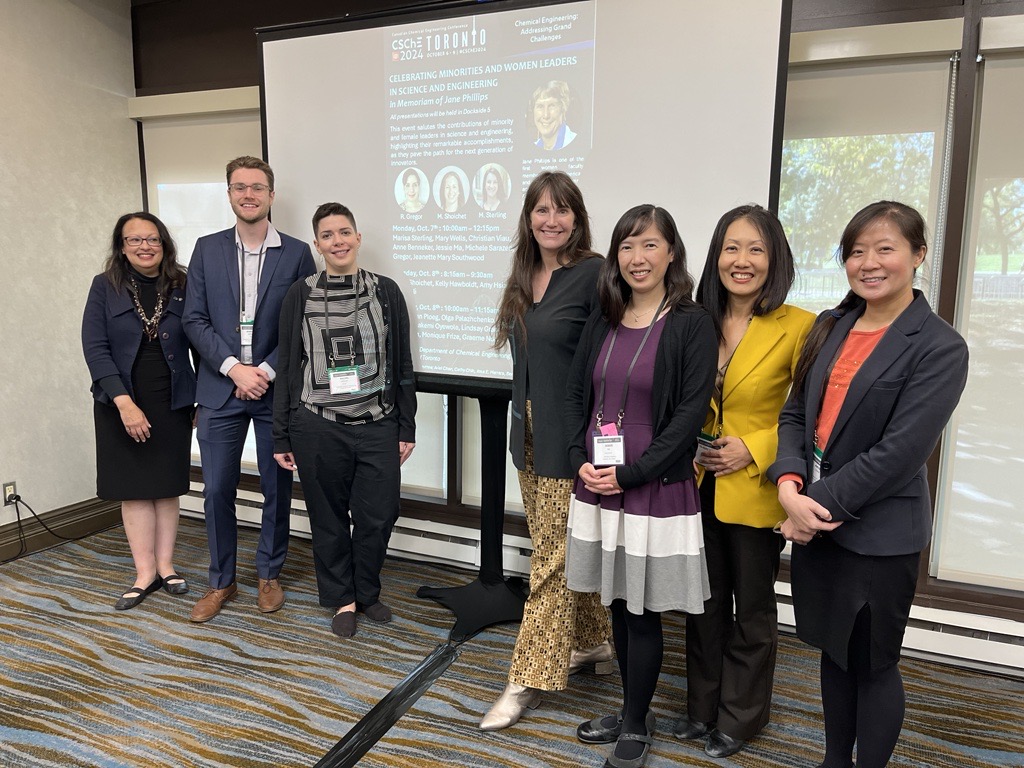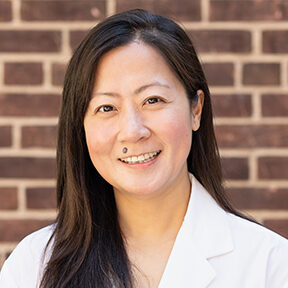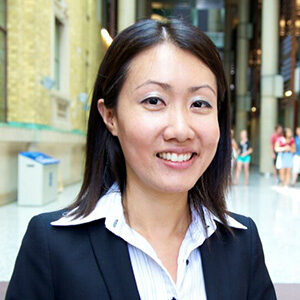U of T Engineering aims to build a community that reflects the societies we serve. On the International Day of Women and Girls in Science, we reflect on how equity, diversity and inclusion (EDI) can be integrated into the core activities of engineering research and education.
Last fall, U of T hosted the Canadian Society for Chemical Engineering (CSChE) 2024 conference. The conference included a unique session titled: Celebrating Minorities and Women Leaders in Science and Engineering: In Memoriam of Jane Phillips.
To learn more about how such sessions can serve as a model, U of T Engineering sat down for an interview with Professors Ariel Chan, Cathy Chin and Ning Yan (all ChemE) as well as Marisa Sterling, P.Eng., Assistant Dean & Director, Diversity, Inclusion and Professionalism at U of T Engineering. Yan was the chair of CSChE 2024, while Chan, Chin and Sterling organized the conference session.
Can you tell us about what inspired the session?
Chin: We were inspired by Professor Jane Phillips (ChemE), who passed away in the spring of 2024. She completed her BASc in our department in 1953; at that time women students were so rare that they didn’t even have female restrooms in engineering buildings.
After a time in industry, she re-joined U of T in 1963 and became one of the first female engineering professors in North America. She was really an icon for many women.
Yan: The goal of this session was to remember the challenges that pioneers like Jane faced, and also celebrate the progress that has been made so far. I think this is the first time that a session like this has been organized at CSChE, and Cathy, Ariel and Marisa did a fantastic job to put it together.
How was it different from a typical conference session?
Sterling: While anyone could attend, the session presenters were invited based on their demonstrated actions towards EDI.
We did research to identify people across the globe who were doing important work to remove barriers and build inclusion in engineering. And we also paid attention to how they identify, ensuring that we reached out to a wide range of people to showcase diversity.
I think the intentionality with which that was done made a real difference. When someone like Cathy or Ariel, who are role models for women in engineering, reaches out and says, ‘I noticed you, there’s something interesting about you,’ it opens up space for new conversations, and that was really important.
Chan: We had an overwhelming response from the people we reached out to. Some of the presenters were still completing their PhD, others were very senior professors or deans of their faculties. We had Black presenters, queer presenters and people from other underrepresented groups. We had speakers from Canada and from as far away as Thailand.
Some of the sessions focused on technical work, such as catalysis, or how to extract useful substances from industrial byproducts. Others focused on engineering education, how to develop critical thinking in students, or to enhance leadership qualities. So, we had many different topics, but EDI intersectionality informed all our choices.
Are there any that stood out to you as particularly memorable?
Chan: Professor Mary Wells, Dean of Engineering at the University of Waterloo, gave a great overview of how the representation of women in engineering has changed over the years. She used a lot of data on what students are enrolled in and what subjects they are taking, and talked about how we can leverage that information to create a balanced, diverse and supportive environment.
Sterling: Professor Jessie Ma from the University of Waterloo gave a talk about the future of electricity. What I heard in that session was a great synthesis of the technical developments in this field, but also what the implications and unintended consequences are for women and other groups that are marginalized within our society.
Chin: University Professor Molly Shoichet (ChemE, BME), from our own department, gave a presentation about intentional leadership, ensuring that we are giving people of all backgrounds an opportunity to prove themselves.
In general, I was fascinated with hearing about the full range of work being done by all these people with different experiences.
Yan: In addition to this session, there were many other activities at CSChE 2024 that addressed EDI considerations. For example, we had Transitioning from Academia to the Workforce: Navigating Opportunities and Challenges for Equity-Seeking Students, a fireside chat sponsored by DuPont and the Chemical Education Fund.
We also held the Black Research Network Award competition, with generous support from U of T’s Black Research Network. EDI was a major theme in the student program, and we encouraged symposium organizers to be more inclusive and avoid all-male panels when selecting invited speakers and session moderators.
What will stay with you going forward?
Sterling: I really felt that presenters were comfortable naming their identity — woman, Black, queer, etc. — publicly in a technical session, and communicating what it meant for them in the work they were doing. I think the way that the session was run provided some safety and trust that might not normally have been present.
Having that be front and centre is a big change from how these types of sessions normally run, and I hope it can be an example that other departments or technical societies can look to in terms of how to evolve their own activities.
Yan: My advice to people who want to do that is: start early. Get the relevant advocacy groups involved and keep implementing best practices to encourage participation.
Chan: After the session, several of the speakers told me that as the diversity of identities in engineering is increasing, they are having an easier time finding the support system that they need. That’s very important in their career development.
Chin: Changing the culture will take a lot of time. But from the years when Professor Jane Phillips began her career until now, you can see that we really have made progress.
It may take a few more generations, but the message we want to send with a session like this is that everyone can be leaders in building access and inclusion.







